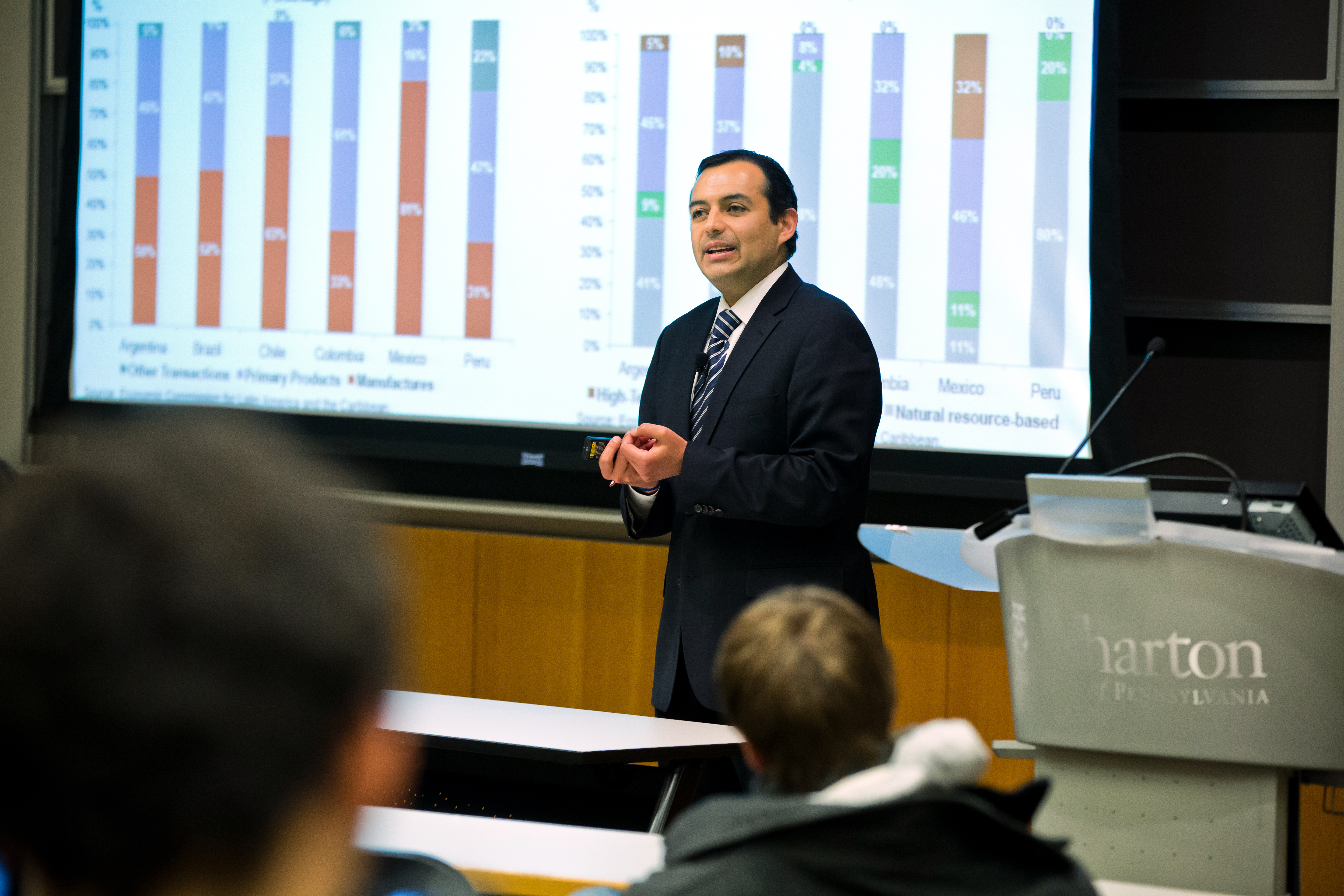
Mexican Senate President Ernesto Cordero, G’98, GR’04, visited Penn this spring to speak on the state of the Mexican economy.
This past February, current Mexican Senate President Ernesto Cordero, G’98, GR’04, visited campus to deliver a lecture on the state of the Mexican economy. Cordero has held two separate Secretary of State appointments—one in social development and one in finance—and in 2011 campaigned to become the elected candidate of the Partido Acción Nacional (National Action Party) in order to run for the Mexican presidency. As Secretary of Finance he was responsible for helping the Mexican economy recover from the 2009 global financial crisis. Below, the senator discusses his time at Penn and the challenges involved in being a high-level policymaker.
Q: When did you first decide to go into policymaking?
It was my interest since I was very young. I finished my undergraduate degree in Mexico then began working for the minister of energy. I felt I needed a good, sound foundation to be able to develop and evaluate policy. I had always liked economics, so I decided to pursue graduate studies in the field, and I chose Penn.
Q: How did your time at Penn prepare you for the road ahead?
It taught me the importance of professionalism and formality, and that you need strong technical foundations in order to deal with all the sea changes. My studies stressed the strength of the quantitative approach, and that has become a way of life for me. I also enjoyed being a teaching assistant, and when I came back to Mexico after graduating from Penn, I began teaching again as a lecturer for a couple of hours per week at the university.
Q: You’ve held two Secretary of State appointments: one in social development and one in finance. Describe those experiences and how they differed.
As Secretary of Social Development, I was able to apply solid foundations and design the application and evaluation of policy. We put together programs that influenced policy in 26 other countries. One in particular, called Oportunidades, is a cash- transfer program that has been applied here in New York City in some form. So for me it was very rewarding be able to apply all this technical stuff to improve the conditions of many Mexicans. It’s very important to see that what you learn at school, and what you do for your professional life, is really changing the lives of so many people.
I also had the opportunity to serve as Secretary of Finance. I was responsible for the recovery of the Mexican economy after the global crisis of 2009. We were able to put together the Mexican economy again. It was a very important job that was very different from being the Minister of Social Development—now you are in charge of the economy of an entire country. You need to be prudent, and often conservative. Stability is the key word. If you have stability then you can build growth. The years that I spent at Penn prepared me to assume that kind of responsibility.
Q: In 2011 you campaigned to become the elected candidate of the National Action Party in order to run for the Mexican presidency. What are some of the challenges of campaigning?
It’s a different kind of challenge. First of all, you need to have a good reason to look for an office—a genuine goal. And then of course you have to be able to communicate that goal to your constituency, to your electorate, and to be able to, in a very simple way, transmit this message. It requires very a different set of skills than that of a policymaker—personal skills.
Q: If you had to pick one issue that you’re most passionate about in your role as a policymaker, what would it be?
To maintain economic growth in Mexico. There are no magic solutions. If you want to be able to provide prosperity to your people, there has to be stability, and there has to be economic growth. Every now and then someone claims to have some magical solution to achieve faster rates of growth, but these are rarely sound, and are not based on the fundamentals of the economy. And it could end up having terrible consequences. So I’m very careful not to take a false exit and go off a cliff. Politicians feel pressure to follow the easy way, the way that is going to be popular with the electorate, popular with the people. But in terms of economic policy, sometimes you have to follow that way that’s not so popular.